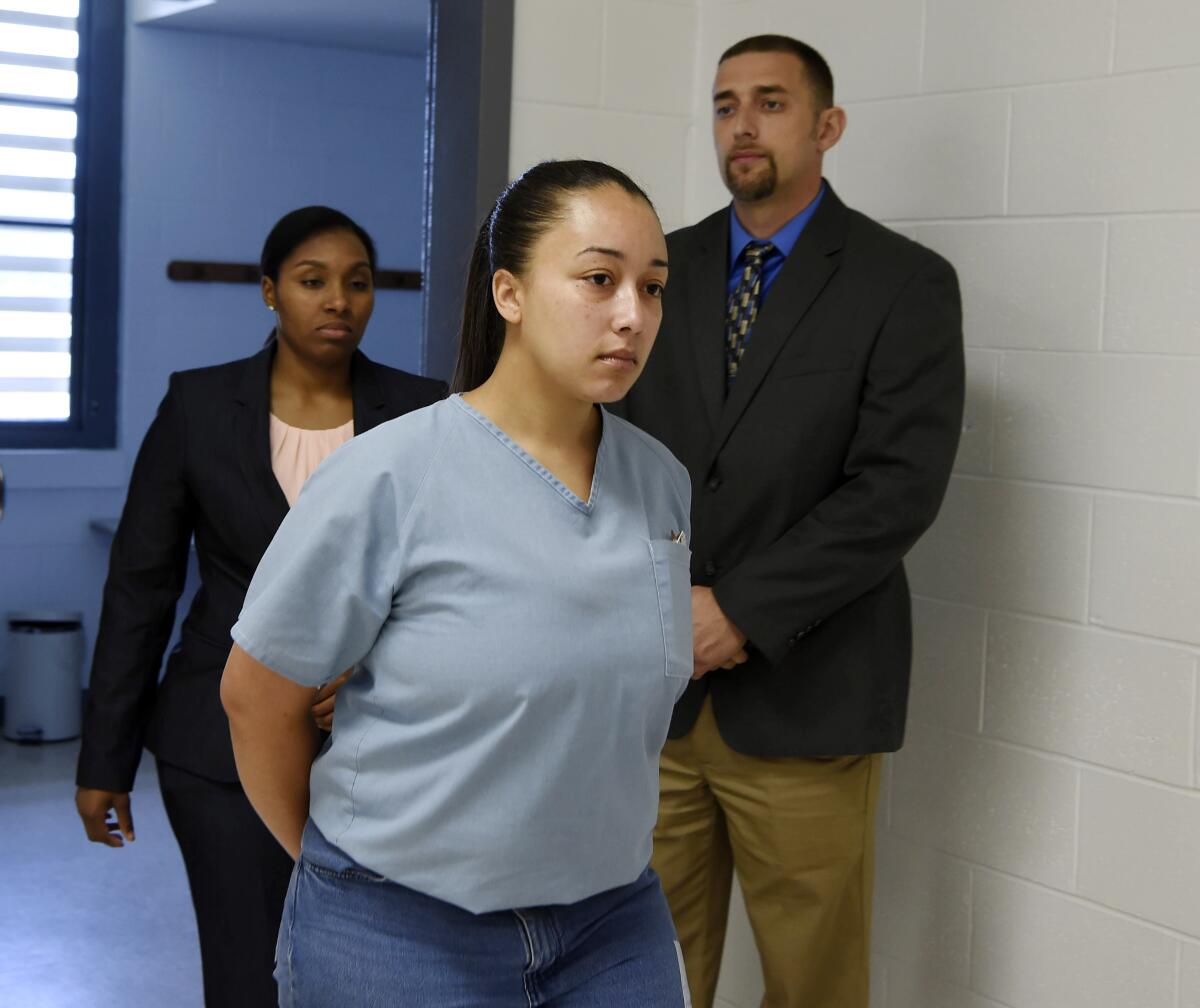Opinion: Girls reporting sexual abuse shouldn’t have to fear being prosecuted

Adolescent girls face a rising rate of sexual violence, according to a recent report from the Centers for Disease Control and Prevention. There’s a parallel crisis that’s not spelled out: Many of the young survivors are punished as if they were criminals.
This is known as the “abuse-to-prison pipeline.” Girls who are sexually abused are often pushed into the legal system and charged with offenses that can trigger a cascade of consequences: a criminal record that can haunt a person for years; confinement in facilities that are unsafe; and long-term sentences that can keep them imprisoned for decades, even for life. For girls of color, the risk of entering the criminal justice system is far higher than for white girls.
Examples of the pipeline are all too common. It happens when girls escape a violent home, but then are charged as runaways. It happens when girls report sexual abuse to police but are charged with false reporting. It happens when girls fight back against adult rapists in self-defense and then are charged with serious offenses. And it happens when children who are sex-trafficked are arrested on suspicion of prostitution or charged as traffickers themselves.
The abuse-to-prison pipeline disproportionately affects girls of color, who are subject to gender and racial bias. But in virtually all cases, police, prosecutors and judges fail or refuse to consider — and prohibit juries from considering — the full context of abuse behind girls’ actions. And sometimes, in a perverse form of paternalism, authorities lock survivors up, citing a dearth of safe alternatives — as if detention is safe for young people who have endured sexual trauma.
State lawmakers have begun to take notice and protect some of these girls. In some states, if a girl has been a victim of trafficking, her criminal record will be cleared of crimes committed as a direct result of her trafficking victimization. Other states now forbid the arrest or conviction of survivors of trafficking or sexual violence if their offenses stem from the abuse, and some allow judges to consider the context of childhood abuse and depart from mandatory minimum sentences when survivors are convicted of harming their abusers. A growing number of states have also passed “safe harbor” laws, which prohibit charges of prostitution against children.
But these efforts are only a beginning. Far more action is needed to disrupt the pipeline.
First, no child survivors in any state should be charged or punished for offenses related to their abuse or exploitation. Judges should be trained to recognize survivors of abuse and understand this complex trauma in the context of adolescent development. Young people who encounter the criminal justice system all should be screened for sexual abuse and exploitation, so the courts do not unwittingly prosecute and punish someone who should be protected. And we must invest in community-based resources and services — beds in appropriate facilities, mental health counselors and treatment — so that survivors of sexual violence have a place to heal and are not incarcerated simply for a lack of any alternative.
Second, Congress must enact laws that protect survivors from being charged and convicted. Laudable as some recent state laws are, federal laws are needed to avoid an uneven and unjust patchwork of protections and to provide guidance to states. One bipartisan bill introduced last year, Sara’s Law and the Preventing Unfair Sentencing Act, would be a start. It’s named after Sara Kruzan, a youth justice advocate and survivor leader who served close to 20 years after being convicted of killing her trafficker when she was 16. The legislation would allow judges to consider a defendant’s age, trauma history and reduced culpability in sentencing decisions. Beyond this, state and federal prosecutors and judges should be required to consider the context of sexual violence in cases against survivors. Above all, trying and sentencing children in the adult system should be forbidden — whether in a case related to abuse or not — given children’s developmental stage, which diminishes their culpability and increases their potential for change. For similar reasons, sentencing children to life in prison without parole should be prohibited.
Finally, we must end what experts have dubbed the “credibility discount” against women and girls who report sexual abuse by prohibiting charges of false reporting when a child has alleged sexual violence. As the CDC report attests, rates of sexual violence against adolescent girls are shockingly high, and yet studies show that they are less likely to be believed than older or younger victims of abuse are. That is especially true for girls of color, whose claims are disproportionately discounted, in part because of harmful stereotypes that cast them as promiscuous, threatening and angry. Unfounded charges of false reporting not only violate victims’ trust in the legal system, but also decrease the incentive to report abusers, ultimately putting other girls and women at risk. Given that detectives have been known to harass victims into recanting their accusations even when they are true, and given children’s special vulnerability to authorities, these charges should be prohibited against youth.
We all can agree on the goal of ending sexual violence. But as long as this violence persists, girls and all youth who experience violence must be respected and supported, and, above all, they should never be punished because of the abuse they have survived.
Rebecca Epstein, an attorney, is the executive director of Georgetown Law’s Initiative on Gender Justice & Opportunity. Yasmin Vafa is a human rights attorney and the executive director of Rights4Girls, a national organization that advocates for safety and justice for young women and girls.
More to Read
A cure for the common opinion
Get thought-provoking perspectives with our weekly newsletter.
You may occasionally receive promotional content from the Los Angeles Times.










